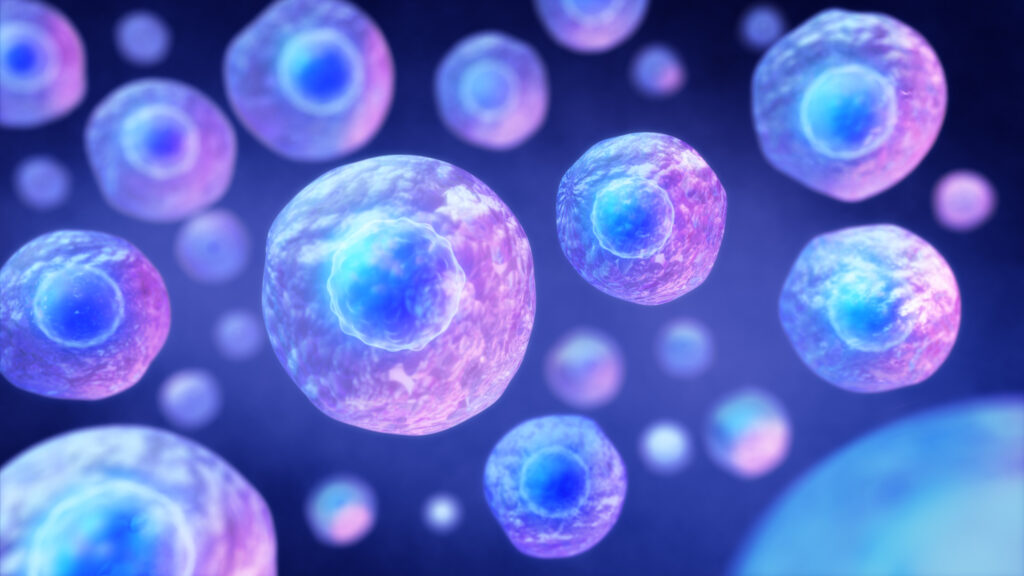Muse Cell Exosomes
Quantity
100 Billion
Freeze Dried Exosomes
Quality
Manufactured in a GMP Facility
Safety
ATMP Approved
Tested for Safety
What are Muse Cells?
Muse (Multilineage-differentiating Stress-Enduring) cells are a unique type of “pluripotent” stem cell known for their ability to differentiate into numerous cell types and endure harsh conditions. These cells are found in small numbers in MSC populations in various tissues, including bone marrow, adipose tissue, and umbilical cord. Muse cells can home to sites of injury, engulf damaged cells, recycle the parts worth saving, and differentiate into the damaged cell type. In culture, Muse cells can be expanded to much higher numbers to increase the pluripotent cell population and thus increase the potential to support more cells and cell types in the body.
Therapeutic Potential of Muse Cell Exosomes
Exosomes are small vesicles secreted by cells that facilitate intercellular communication by delivering their cargo of growth factors, proteins, miRNAs, metabolites, and lipids. Muse Cell exosomes contain the cargo of pluripotent cells that can support the >200 human cell types and have some properties unique to them compared to MSCs. Muse Cell Exosomes are isolated from umbilical cord tissue because it is a young source of MSCs and Muse Cells and provides more robust cells without the DNA damage and cellular deterioration found in adult cells. Muse Cell Exosomes have shown potential to:
Modulate the Immune Response: By influencing immune cells, these exosomes can create a more balanced immune environment to strengthen the body’s defenses against illness, injury, and aging.
Reduce Inflammation: Muse Cell Exosomes possess anti-inflammatory properties that can help mitigate acute and chronic inflammation associated with illness, injury, and today’s lifestyle diseases.
Assist in Tissue Regeneration: They can stimulate the repair and regeneration of damaged and aging tissues, which is crucial for staying healthy, vibrant and energetic as we age.

Through a patent-pending process that expands the Muse Cell population in culture, the isolated exosomes provide a highly enriched source of growth factors, proteins, miRNAs and other compounds that support every cell type in the body. The Muse Cell Exosomes are freeze-dried, making them a shelf-stable, cell-free option for treating a variety of conditions. For more information on Muse cell exosomes, please contact Muse Cell Bio.
Ready to Transform Patient Care?
Get in touch with our regenerative medicine experts today.
References
Kuroda Y, Kitada M, Wakao S, Nishikawa K, Tanimura Y, Makinoshima H, Goda M, Akashi H, Inutsuka A, Niwa A, et al. Unique Multipotent Cells in Adult Human Mesenchymal Cell Populations. Proc. Natl. Acad. Sci. USA 2010, 107, 8639–8643.
Yamashita T, Kushida Y, Abe K, Dezawa M. Non-Tumorigenic Pluripotent Reparative Muse Cells Provide a New Therapeutic Approach for Neurologic Diseases. Cells. 2021 Apr 20;10(4):961.
Alessia, N,; Ozcan, S; Tatsumi, K.; Murat, C.;, Peluso, G.; Dezawa,M.; and Galderisi, U. CELL CYCLE. 2017, VOL. 16, NO. 1, 33–44. http://dx.doi.org/10.1080/15384101.2016.1211215
Teng L, Maqsood M, Zhu M, Zhou Y, Kang M, Zhou J, Chen J. Exosomes Derived from Human Umbilical Cord Mesenchymal Stem Cells Accelerate Diabetic Wound Healing via Promoting M2 Macrophage Polarization, Angiogenesis, and Collagen Deposition. Int J Mol Sci. 2022 Sep 9;23(18):10421.
van Niel G, D’Angelo G, Raposo G. Shedding light on the cell biology of extracellular vesicles. Nat Rev Mol Cell Biol. 2018 Apr;19(4):213-228.

